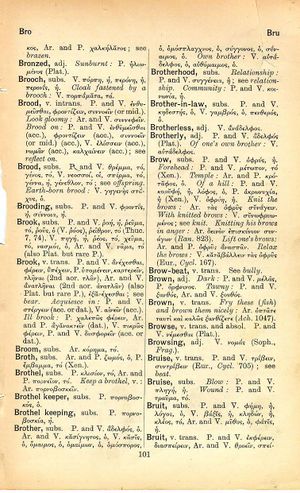brood: Difference between revisions
From LSJ
διὸ καὶ μεταλάττουσι τὴν φυσικὴν χρῆσιν εἰς τὴν παρὰ φύσιν αἱ δοκοῦσαι παρθένοι τῶν εἰδώλων → therefore those professing to be virgins of the idols even change the natural use into the unnatural (Origen, commentary on Romans 1:26)
(nlel) |
m (Woodhouse1 replacement) |
||
| Line 1: | Line 1: | ||
{{Woodhouse1 | {{Woodhouse1 | ||
|Text=[[File:woodhouse_101.jpg|thumb|link={{filepath:woodhouse_101.jpg}}]] | |Text=[[File:woodhouse_101.jpg|thumb|link={{filepath:woodhouse_101.jpg}}]] | ||
===verb intransitive=== | |||
P. and V. ἐνθυμεῖσθαι, φρονιτίζειν, συννοεῖν (or mid.). | [[prose|P.]] and [[verse|V.]] [[ἐνθυμεῖσθαι]], [[φρονιτίζειν]], [[συννοεῖν]] (or mid.). | ||
[[look gloomy]]: [[Aristophanes|Ar.]] and [[verse|V.]] [[συννεφεῖν]]. | |||
[[brood on]]: [[prose|P.]] and [[verse|V.]] [[ἐνθυμεῖσθαι]] (acc.), [[φροντίζειν]] (acc.), [[συννοεῖν]] (or mid.) (acc.), [[verse|V.]] [[ἑλίσσειν]] (acc.), [[νωμᾶν]] (acc.), [[καλχαίνειν]] (acc.); see [[reflect on]]. | |||
===substantive=== | |||
P. and V. [[θρέμμα]], τό, [[γένος]]. τό, V. νεοσσοί, οἱ, [[σπέρμα]], τό, [[γέννα]], ή, [[γένεθλον]], τό; see [[offspring]]. | [[prose|P.]] and [[verse|V.]] [[θρέμμα]], τό, [[γένος]]. τό, [[verse|V.]] [[νεοσσοί]], οἱ, [[σπέρμα]], τό, [[γέννα]], ή, [[γένεθλον]], τό; see [[offspring]]. | ||
[[earth-born brood]]: [[verse|V.]] [[γηγενὴς στάχυς]], ὁ. | |||
}} | }} | ||
{{nlel | {{nlel | ||
|nleltext=[[σιτίον]], [[σιτοποιός]], [[σῖτος]] | |nleltext=[[σιτίον]], [[σιτοποιός]], [[σῖτος]] | ||
}} | }} | ||
Revision as of 08:52, 20 May 2020
English > Greek (Woodhouse)
verb intransitive
P. and V. ἐνθυμεῖσθαι, φρονιτίζειν, συννοεῖν (or mid.).
look gloomy: Ar. and V. συννεφεῖν.
brood on: P. and V. ἐνθυμεῖσθαι (acc.), φροντίζειν (acc.), συννοεῖν (or mid.) (acc.), V. ἑλίσσειν (acc.), νωμᾶν (acc.), καλχαίνειν (acc.); see reflect on.
substantive
P. and V. θρέμμα, τό, γένος. τό, V. νεοσσοί, οἱ, σπέρμα, τό, γέννα, ή, γένεθλον, τό; see offspring.
earth-born brood: V. γηγενὴς στάχυς, ὁ.

